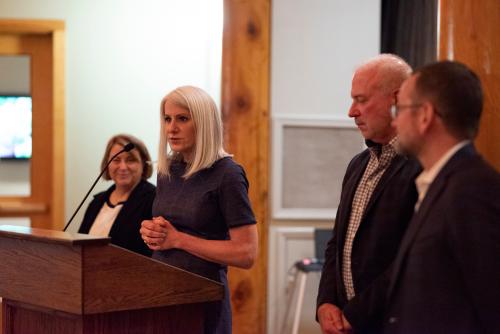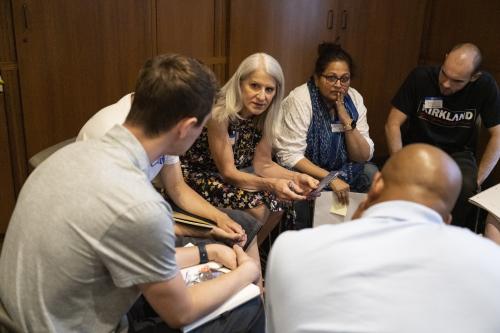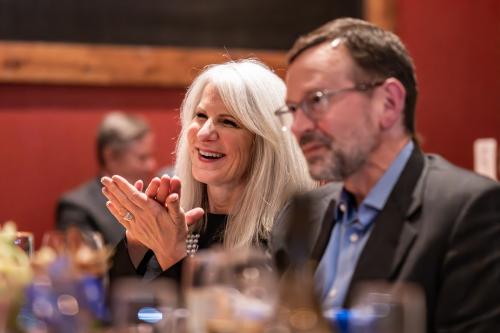At the beginning of August 2024, Angela Eberts retired from her 15-year career at Duke—a career that began at the Fuqua School of Business and ended with her position as Director of Development at The Graduate School. Read below to learn about Angela's transition from the world of banking to higher education and fundraising, her reflections on being a working mother, and her advice for young professionals, especially at Duke.
First, tell us about yourself! What first drew you to the role of director of development for The Graduate School?
I’m Angela, and I’ve worked in development for The Graduate School for about 7 years now, with the last five as the director. I've been at Duke for 15. But before this, I had a career in banking—not investment banking, but in product management developing technical payment products for banks. In 2004, I was working at J.P. Morgan, and my husband was offered a position in the senior management team at LabCorp here in the Triangle. So, we moved here from Chicago, and J.P. Morgan said that they’d like me to keep working and that I could work virtually.
When you think about my age and stage in life, I've been on the frontlines of advocating for flexibility for myself and others as a woman and a mother. So, when I had my first child in the ‘90s, I worked in a hybrid setup, which was unusual at that time. Moving to NC I took it a step further with being fully remote for about 5 1/2 years. And with my kids both being really young, it was hard to be in a home office with the door closed for most of the day—and then to come out at the end of the day to make dinner and be with the family. Like coming out of the cave and into the bright light.
So then when I started looking for something locally, I was really attracted to Duke. The environment was so colorful and inviting, with lots of smart people, and I felt like I was back with the kind of people I wanted to be with. So, I was all in from that point, and I just loved it. And with my MBA from Northwestern and career in business, it was a great fit to go and work at the Fuqua School of Business.
It was a really interesting time when I came on in September 2009. The economy was tanking, and a lot of graduating college students across the country weren't getting jobs. And when you think about what the next step is for somebody at that age, if they're not going straight into a job, a lot of times the alternative is law school. Well, that isn’t always the best solution and shouldn’t be the only alternative. So, Fuqua was innovative, and they had noticed these one-year, “pre-experience” master’s degrees that were being used in a lot of universities across Asia and other international markets. There were none of those in the US at the time, so Fuqua launched their own program really quickly in the summer of 2009, and I was brought on in September with that first batch of about 100 students. My role was to build the career and professional development programming and coaching, to figure out student needs, and to build an employment market for graduates that were not MBAs or seniors in college. So, my background in product development and management provided the translatable skills that I used to work alongside a talented Fuqua team to launch this new program, prepare the cohort for their careers, and get them jobs. This was the first place that I saw how the Duke alumni love to support our students because they were mentoring and hiring our students.
Earlier, you spoke about women and motherhood in the context of the workplace. Have you seen progress or change on that front during the time you’ve been at Duke?
I’ve seen a lot of things change, while at Duke and across my lifetime. I mean, I even saw the internet come into play, which has made professional flexibility so much more feasible. So, change is a major theme over my decades of working, and my career has reflected that.
In terms of women's flexibility, I had some great role models in my life. And, to me, even though my husband has been very successful, it was important to always have a career of my own. I never wanted to quit working.

Banking is a more traditional environment, so it was like we were crossing boundaries that hadn't been crossed before. For example, when my son was born in 1998, the bank was open to alternative work setups, but there wasn’t a set system in place. So, I created a giant proposal outlining all the technical equipment I would have in my home office, my hours, and the daycare I had put in place. And it was a big deal, getting that approved. It was like—yes, you can do this here if you ask the right questions and really have the established credibility so that people trust you.
The tables have turned to some extent. Now, there’s a greater sense that employers need to figure out how to accommodate their employees’ needs. Still, we haven't fully gotten to a place where everybody's totally comfortable on how that exactly works, and it's different for every manager and every workplace. I do think that going through the COVID-19 pandemic really blasted everything open. Everybody (not just parents) realized they could do their work from home, and they might have different reasons for wanting or needing that.
At the same time, though, something we might be losing is the thing that really inspired me in my career: the ability to see people in action (especially successful women, in my case) and figure out how they got to where they are and how they do what they do. You're not able to observe this if you're completely remote. And with so much of our workforce now coming out of college, I think it's working against them because they're not developing the same mentors and social skills and seeing future paths that they could follow.
What have been some of your most rewarding and challenging experiences, either in your most recent role or across your career?
I think the biggest challenge relates to those translatable skills I talked about earlier. If you look at my resume, I definitely have done different types of things, but there’s a strong theme of building new things, starting new initiatives, working with new organizations, and things like that. So, I've embraced change, but that also stretches and challenges you. For example, when I came to Duke to work at Fuqua, I had to adjust from the very buttoned-up, structured atmosphere of JP Morgan to the very different environment of higher education. You have to be open-minded and flexible and figure out how to interpret your skills into these different environments.
The rewarding part has been that I've gotten close to and worked with so many amazing people. At Fuqua, I always had students coming to me for coaching or development and things like that. And then I went into development, working in fundraising, and suddenly I was the one reaching out and engaging people. So, this again was another shift for me, but it was still about developing relationships with people.
I still keep in touch with some of the students I worked with, and I’m so happy to see what they're doing in their careers. And the alumni I've worked with in The Graduate School have been amazing, interesting people. My highest passion is just learning more about people and asking them questions.
Can you tell us more about development as a field and what it means to you, both in relation to fundraising and beyond?

That's a great question, because I’m sure we’ve all encountered fundraisers. And sometimes you want to support causes, but you don't really want that feeling that you can get when people are sidling up next to you and just kind of trying to get your money.
But then I got to see firsthand how supportive the alumni here are. I saw people who were working overnight in investment banking jobs, just starting out in their careers, and they were still so happy to come to campus and talk to students. I started seeing how generous they were and how passionate. Then I started to understand the idea of the “evolution of relationships” with engagement, and how much involvement there is outside of money. And I've never had to pressure anybody or twist their arm to give. They give if and when they want to, and it’s just a natural part of the bigger relationship that they have with Duke.
I would say all my fundraising has always been relationship-based, and luckily, I've never had to do anything different. There’s the annual fund which is a little more transactional, but even then we’re sending personalized emails asking for annual fund contributions. And then major gifts (gifts of $100,000 or more) will usually come out of a longer conversation about what the donors are interested in supporting. So, you fine-tune depending on the conversation or the scenario, but it's never like you're harassing them, banging on their door, or making them feel like they have to do something.
What words of advice might you give to aspiring or early-career professionals?
I think it's important to really just always stay curious and not stagnate in your role. Don’t get too comfortable because there are always places to grow, and you're never going to run out of opportunity.
Duke in particular has many different centers, colleges, and entities rolled into one university, and we love to hire from within. And the culture is so strong—people want to network. So, I’d encourage reaching out, meeting people, attending events and presentations, and getting to know the people that are behind the scenes. (I know I’ve really enjoyed a lot of the arts and culture events, like the American Dance Festival and Full Frame Documentary Film Festival.) And then maybe you meet some wonderful people there who you’d like to work with in future.
I think it's important to really just always stay curious and not stagnate in your role. Don’t get too comfortable because there are always places to grow, and you're never going to run out of opportunity.
Angela Eberts
So stay fresh, be curious, and get to know people. Try to be in the office sometimes. And keep learning—like when I did my MBA at night while working full time. You’d think it was really hard, but it felt like I was growing, and I met more people whom I'm still friends with to this day. So, keep thinking about what your skills are and where you want to be.
How would you describe the Duke community, its values, and what it represents in the world?
Duke is ever-changing. The Triangle is sort of like this bubble in the middle of the South. It has gone from being an excellent regional to a prominent global school now, and that’s the thing that we have to figure out—how to take advantage of our global position and really engage our alumni more broadly across the world.
I was attracted to The Graduate School in particular because there was a lot of untapped potential with alumni who were under-engaged. It’s important to note that one in six students at Duke is a Ph.D. student. There are now more graduate and professional students than undergraduate students at Duke, and there are over 30,000 graduate alumni. There’s a lot of opportunity there. So, what we’ve been doing is raising the awareness of the value of the graduate student and the graduate population within the whole institution.
And we have great leadership in place. It's been amazing to work with two different female deans who are completely different and both wonderful in their own ways. Dean Suzanne Barbour really just connects with people. I have so much respect for her, and it's been great to see her as she's moved into being in this role for a few years, really making a difference. So, I think a lot about the space I'm in, The Graduate School, and how we fit into the bigger picture of the university. Graduate education is being acknowledged as an important part of all of our most important initiatives as we move forward in our campaign and the Centennial.
As you prepare to retire, do you have any big plans? What are you most excited about in this new stage of life?
This is a funny question because I have worked since I could pull a wagon around the neighborhood, making and selling little crafts with my best friend. And then as soon as I could get a job, I worked at the local Baskin Robbins, even when I wasn't 16. So, I have worked forever, and it's very weird to stop working. I don't think I'll be able to sit still, and I've been making a long list of things I want to do.

My husband and I love to travel, so we have some exciting, longer trips planned. That's number one on our agenda. I would also like to volunteer and work as an advisor or board member, since I didn't really have enough time to do that in my working life with the family and everything. I'm really excited to do more reading without falling asleep trying to read at night. I do Pilates about six days a week, but I have no coordination, and I'm hoping to invest some time into learning pickleball or golf or something like that. And I'd really like to explore some courses with the Forever Learning Institute or the Osher Lifelong Learning Institute.
I'd also like to learn more about AI and take some of the online certification courses. I feel like I have a buffet of options. It's very exciting.
And as you hand off your role as director of development to Allison Boyer, what can you say about this position’s next era?
When I hired Allie, I had in the back of my mind that I was thinking about my retirement timeline, though I hadn't decided specifically when. There was also the dean transition to consider, and my daughter’s college graduation in May, so all of these pieces were playing in my mind.
In working with Allie, I saw that she’s very talented. She has some great experience, and she's really smart and a quick learner. Having worked with me as associate director for development for a year, added to her previous development experience, she’s in a place where she's able to take the reins. And she and Dean Barbour have a good relationship, which is especially important. So, Allie is really just poised to advance in her career, and this is a perfect next step. And it makes me feel very comfortable walking away from the role, knowing that it’s in such good hands.